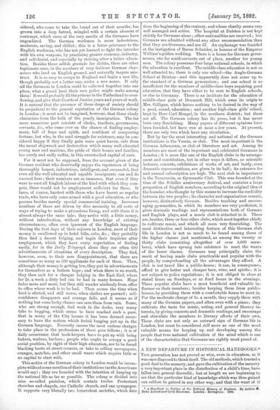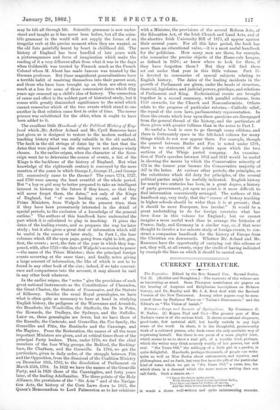A NEW DEPARTURE IN HISTORICAL HANDBOOKS.*
THIS generation has not proved so wise, even in education, as it was once disposed to think itself. The old methods, which trusted a good deal to the memory, and gave the cultivation of the memory a very important place in the distribution of a child's time, have fallen into general discredit; but at length we are beginning to see that the particular kind of knowledge which was thus gained can seldom be gained in any other way, and that the want of it • A Handbook in Outline of the Political History of England. By Arthur H. Dyke Aeland and Cyril Dansorne. London Itivingtons. 18$2.
may be felt all through life. Scientific grammar is now under- stood and taught as it has never been before, but all the scien- tific grammar in the world will not supply the forms of an irregular verb at the precise moment when they are wanted, as the old lists painfully learnt by heart in childhood did. The history of England has been handled of late years with a picturesqueness and force of imagination which make the reading of it a very different affair from what it was in the days when Goldsmith was treated by Pinnock much as the French Colonel whom M. About has made famous was treated by the German professor. But these magnificent generalisations have a terrible habit of resolving themselves into their parent mist, and those who have been brought up on them are often very much at a loss for some of those convenient dates which fifty years ago summed up a child's idea of history. The connection of cause and effect is the noblest part of historical study, but it comes with greatly diminished significance to the mind which cannot remember which of the two events which stand to one another in that relation came first in order of time. The newer process was substituted for the older, when it ought to have been added to it.
The excellent little Handbook of the Political History of Eng- land which ,Mr. Arthur Acland and Mr. Cyril Ransome have just given us is designed to restore to the modern method of teaching history what was really valuable in the old method. The fault in the old strings of dates lay in the fact that the dates that were placed on the strings were not always wisely chosen. In the earlier reigns, when the character of the Sove- reign went far to determine the course of events, a list of the Kings is the backbone of the history of England. But what knowledge of the eighteenth century is conveyed by the mere mention of the years in which George I., George IL, and George III. successively came to the throne F The years 1714, 1727, and 1760 were among the least eventful of the whole period. But "a boy or girl may be better prepared to take an'intelligent interest in history in the future if they know, so that they will never forget them, the dates," not only of the Kings of England, but "of some leading events, and of the Prime Ministers, from Walpole to the present time, than if they have been prematurely interested in the detail of special periods, to the exclusion of a knowledge of the general outline." The authors of this handbook have underrated the part which it is calculated to play in teaching. It gives the dates of the leading events, and so prepares the way for later study ; but it also gives a great deal of information which will be useful in the course of later study. In Part I., the four columns which fill the open page, going from right to left, give, first, the events ; next, the date of the year in which they hap- pened, with, after 1721—the date of Walpole's accession to power —the name of the Prime Minister ; then the principal foreign events occurring at the same time; and finally, notes giving a large amount of information, the like of which is not to be found in any other book of the size; indeed, if we take conveni- ence and compactness into the account, it may almost be said in any other book whatever.
In the earlier reigns, the " notes " dive the provisions of such great national instruments as the Constitutions of Clarendon, the Great Charter, the Statute of Pra3munire, and the Statute of Kilkenny. Besides the usual Royal genealogies, we have what is often quite as necessary to have at hand in studying English history, the pedigrees of the Warrennes and Arundels, the Beauforts, the Woodvilles, the Staffords, the De la Poles, the Howards, the Dadleys, the Sydneys, and the Suffolks. Later on, these genealogies are fewer, but we have those of the Russells, the Carterets, and Granvilles, the Fox family, the Grenvilles and Pitts, the Bentincks and the Cannings, and the Napiers. From the Restoration, the names of all the more important Ministers are given, and at critical times those of the principal Party leaders. Thus, under 1770, we find the chief members of the four Whig groups, the Bedford, the Rocking- ham, the Chatham, and the Grenville. In 1784, we get the particulars, given in daily order, of the struggle between Pitt and the Opposition, from the dismissal of the Coalition Ministry on December 18th, 1783, to the dissolution of Parliament on March 25th, 1784. In 1822 we have the names of the Grenville Party, and in 1828 those of the Canningites, and forty years later, of the leading Adullamites. The three points of the Holy Alliance, the provisions of the Six Acts" and of the Naviga- tion Acts, the history of the Corn Laws down to 1815, the Queen's Memorandum to Lord Palmerston as to her relations with a Minister, the provisions of the several Reform Acts, of the Education Act, of the Irish Church and Land Acts, and of the abortive Irish University Bill of 1873, all appear against their several years. For all this later period, the book has more than an educational value,—it is a most useful handbook for the politician. How many .men are there, for example, who remember the precise objects of the Home-rule League, as defined in 1870; or know where to look for them, if they have forgotten them P But they will find them set out under that year in this little volume. Part H- is devoted to summaries of special subjects relating to English history. The dates of the leading incidents in the growth of Parliament are given, under the heads of structure, financial, legislative, and judicial powers, privilege, and relations of Parliament and King. Ecclesiastical events are brought together in a second summary, with parallel columns, from 1559 onwards, for the Church and Nonconformists. Others relate to the progress of particular reforms,—Catholic
the repeal of the corn laws, parliamentary representation. In these the events which bear upon these questions are disengaged from the general thread of the history, and the particulars of them given with greater fullness than in the notes to Part I.
So useful a book is sure to go through many editions, and there is fortunately space in the left-hand column for many things which do not now appear there. For example, though the quarrel between Burke and Fox is noted under 1791, there is no statement of the points upon which the two sections of the Whigs parted company. An examina- tion of Peel's speeches between 1832 and 1811 would be useful in showing the means by which the Conservative minority of 172 in the former year became the Conservative majority of 367 in the latter. At various other periods, the principles, or the substitutes which did duty for principles, of the several political parties might be usefully indicated. English history for nearly two centuries has been, in a great degree, a history of party government, yet upon no point is it more difficult to find information conveniently arranged. The authors of this handbook say, very truly, that the "course of history teaching in higher schools should be wider than it is at present ; that it should be more European, less insular." It would be a great undertaking to do for foreign countries what han been done in this volume for England ; but we cannot imagine a more useful work than to arrange the histories of France, Italy, and Germany in a similar way, or, if that were thought to involve a too minute study of foreign events, to con- struct a companion handbook for the history of Europe from the Christian era downwards. Whether Mr. Acland and Mr. Ransome have the opportunity of carrying out this scheme or not, they will, at all events, enjoy the credit of having indicated by example the lines on which it should be carried out.







































 Previous page
Previous page